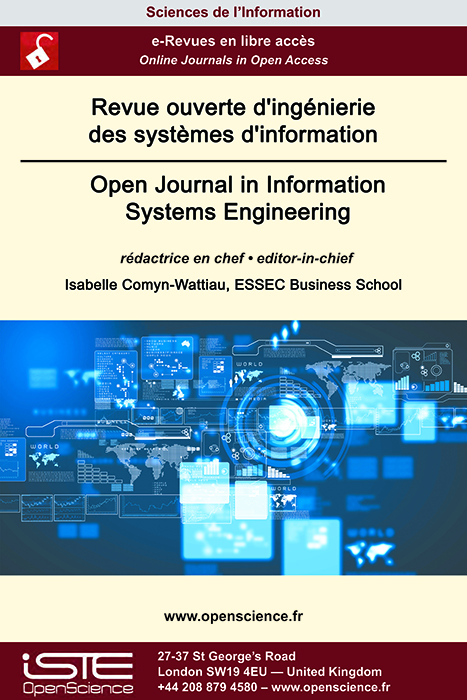

Information and Communication > Home > Open Journal in Information Systems Engineering > Issue
Ce numéro spécial de la “Revue ouverte d’ingénierie des systèmes d’information” rassemble des articles étendus des éditions 2023 et 2024 du congrès INFORSID.
The Circular Economy consists in producing goods and services in a sustainable way by limiting the consumption and waste of resources and the production of waste. Pressure from laws, stakeholders and customers leads organization to review their practices and adopt the circular economy principles to improve the circularity of their supply chains. In practice, companies look for a way to make their supply chains more circular. A successful transition towards circular supply chains requires continual measurement of progress towards circularity. The main contribution of this paper is a method called CircuSChain that aims at guiding organizations in order to evaluate and design more circular supply chains. The method, formalized in the form of an intentional process model and a product meta-model, is based on the use of a generic model of circular supply chains, a serious game to simulate the structure and operating of a circular supply chain, and a circularity indicator to calculate the circularity of a supply chain. This paper extends a previous article [KUR 23] by detailing these tools used by the method as well as all the protocols used in the different strategies proposed by the method.
Business processes digitalization is a crucial challenge for companies, providing the opportunity to enhance their efficiency, quality, and execution speed. This transformation cannot be fully achieved without a thorough mastery of individual expert knowledge, collaborative management, and knowledge formalization, as well as a complete adoption of new technologies. This paper proposes a methodological approach based on knowledge elicitation for the design of formal, consensual, and shared ontologies. A binomial analysis of the acceptability of digital technologies complements this process to better understand the requirements and concerns of experts and to propose appropriate solutions. The proposed approach is experimentally tested on industrial collaboration projects in the field of manufacturing (associating knowledge sources from multinational companies) and in the field of viticulture (associating explicit knowledge and implicit knowledge acquired through observation.
Educational information systems make it possible to observe learners’ learning traces and to carry out analyses of their behaviour or to predict their success. In this work, we study how Process Mining can be used in contextual recommender systems. We are focusing in particular on Trace Clustering, which aims to group together traces with similar dynamics. Our contributions concern the definition of an architecture for recommendation that uses Trace Clustering and the characterization of the learning styles of the identified groups. We validate our proposal on data collected from an introductory course in UI programming.
Faced with the development of big data and its application to personal data, the European legislator has provided a protective legal framework: the "General Data Protection Regulation" (GDPR). When it came into force on May 25, 2018, the issue of obtaining consent prior to any processing of personal data was at the heart of the concerns of targeted advertising, particularly programmatic advertising, and of performance analysis. This has led to the emergence of service providers specialized in the creation of consent collection interfaces, the Consent Management Platforms (CMP), but also to the multiplication of dark patterns aiming at forcing the obtaining of such consent. In this research, we identified the dark patterns used by a set of press sites and then used the dark pattern typology of Gray and his co-authors to classify the designs. We then discussed, on the one hand, their legality and, on the other, their ethics (from the point of view of the utilitarian and deontological approaches). Finally, we discuss the best ways of combating the abuses observed. In particular, we demonstrate the existence of a grey area that allows professionals to maximise, sometimes temporarily, the amount of personal data collected.
This article presents a selection of four of the thirteen short papers from the Forum for Young Researchers (JCJC) at INFORSID 2024. It provides a snapshot of the French research landscape as seen by PhD students in information systems. These works demonstrate the community’s commitment to developing responsible systems, both socially and environmentally. Some of the studies also consider new innovations in artificial intelligence. This article covers various themes such as security, research integrity, multimodal scene analysis, and data frugality.
The growing influence of social networks in the field of tourism highlights the need for effective automatic natural language processing (NLP) approaches to exploit this resource. However, transforming multilingual, informal and unstructured texts into structured knowledge remains a challenge, not least because of the need for annotated data for model training. This paper first examines different learning-based NLP techniques and models to optimise performance while reducing the need for manually annotated data. A new multilingual dataset (French, English, Spanish) specific to tourism has been created, focusing on the Basque Country region. This dataset includes tweets with manual annotations on spatial named entities, tourism thematic concepts and sentiments. A comparison of fine-tuning and few-shot learning methods with multilingual models indicates that few-shot techniques can produce good results with few annotated examples. Experiments conducted on this dataset suggest the possibility of applying learning-based NLP methods to various domains, while reducing the need for manual annotations and avoiding the complexities of rule-based methods. Secondly, we present TextBI, a generic multimodal dashboard designed to present multidimensional text annotation analysis on large volumes of multilingual social media data. The tool focuses on several dimensions: spatial, temporal, thematic and personal, and also supports additional enrichment data such as sentiment and engagement. Our approach, TextBI, represents a significant advance in the field of NLP annotation results visualisation by integrating and blending features from a variety of Business Intelligence, Geographic Information Systems and NLP tools.

2026
Volume 26- 6
Special Issue2025
Volume 25- 5
Issue 12024
Volume 24- 4
Special Issue2023
Volume 23- 3
Special issue2021
Volume 21- 2
Issue 12020
Volume 20- 1
Issue 1